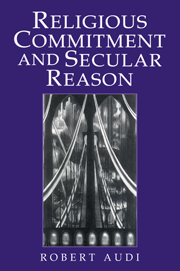Book contents
- Frontmatter
- Contents
- Preface
- PART ONE THE FOUNDATIONS OF DEMOCRACY AND THE SEPARATION OF CHURCH AND STATE
- 1 The Plurality of Paths to Liberal Democracy
- 2 The Separation of Church and State
- 3 Church-State Separation and the Justification of Governmental Power
- PART TWO THE ETHICS OF CITIZENSHIP AND THE BALANCE OF RELIGIOUS AND POLITICAL ARGUMENTS
- PART THREE CIVIC VIRTUE AND POLITICAL ACTIVISM IN A RELIGIOUSLY PLURALISTIC DEMOCRACY
- Conclusion: Ethics, Religion, and Democracy
- Notes
- Index
2 - The Separation of Church and State
Published online by Cambridge University Press: 05 June 2012
- Frontmatter
- Contents
- Preface
- PART ONE THE FOUNDATIONS OF DEMOCRACY AND THE SEPARATION OF CHURCH AND STATE
- 1 The Plurality of Paths to Liberal Democracy
- 2 The Separation of Church and State
- 3 Church-State Separation and the Justification of Governmental Power
- PART TWO THE ETHICS OF CITIZENSHIP AND THE BALANCE OF RELIGIOUS AND POLITICAL ARGUMENTS
- PART THREE CIVIC VIRTUE AND POLITICAL ACTIVISM IN A RELIGIOUSLY PLURALISTIC DEMOCRACY
- Conclusion: Ethics, Religion, and Democracy
- Notes
- Index
Summary
Liberal democracies are free societies and are above all committed to preserving basic liberty and basic equality of political power. There are many conceptions of liberal democracy. We have seen the possibility of a spectrum ranging from pure proceduralist conceptions to strong constitutional frameworks. At one end, perhaps unoccupied by any major historical figure in the liberal tradition, are minimalist, procedural conceptions that simply provide for a framework in which democracy can operate; they impose no constraints on the social goals appropriate to a free and democratic society. At the other end are rich substantive conceptions that build in such goals as human flourishing and respect for persons. On any of these conceptions, and certainly on any plausible constitutionalist view, freedom of religion will be a central value to be preserved.
Constitutional democracies are the main concern of this book. It is not necessary to present a full-scale account of a constitutional liberal democracy, but I will proceed on the working hypothesis that a major basis for determining how much substance may be built into the constitutional structure of a liberal democracy is what might be called a fidelity to essential premises standard: a liberal political theory meant to guide such a democracy should incorporate in its vision of a just society enough to fulfill the theory's essential underlying ideals – and include nothing inconsistent with them. We have seen reasons to hold that realizing this vision precludes governmental preference for any particular religion.
- Type
- Chapter
- Information
- Religious Commitment and Secular Reason , pp. 31 - 58Publisher: Cambridge University PressPrint publication year: 2000



